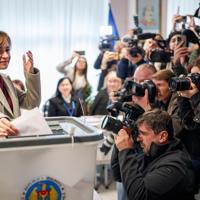Moldova narrowly votes for EU membership – World News

CHISINAU
A referendum on Moldova joining the EU passed with a razor-thin majority on Monday as pro-Brussels President Maia Sandu blamed the outcome on foreign meddling in a veiled reference to Russia, which denied the accusations.
The Kremlin called on Sandu to “prove” election interference in the ex-Soviet republic bordering war-torn Ukraine and alleged “anomalies” in Moldova’s vote count.
Sandu managed to top the first round of presidential elections held at the same time as the referendum on Oct. 20, but will face a tough second round against Alexandr Stoianoglo, a former prosecutor backed by the pro-Russian Socialists.
Sandu applied for her country of 2.6 million people to join the European Union following Russia’s invasion of Ukraine in 2022.
With more than 99 percent of the votes counted, the “yes” vote was slightly ahead at 50.28 percent, just 8,000 votes more than the anti-EU camp.
A stern Sandu said late on Oct. 20 that Moldova had witnessed “an unprecedented assault on our country’s freedom and democracy,” blaming “criminal groups, working together with foreign forces hostile to our national interests.”
In the presidential election, Sandu gained more than 42 percent of the vote, while Stoianoglo picked up a higher-than-expected 26 percent.
A second round is scheduled for Nov. 3.
The referendum result, even with the slim victory for the pro-EU camp, “weakens the pro-European image of the population and the leadership of Maia Sandu,” Florent Parmentier, a political scientist at Paris-based Sciences Po, told AFP.
Describing the result as a “surprise,” he said it would not impact the accession negotiations with Brussels, which began this June, though a clear “yes” would have been “a clear positive signal.”
Parmentier added the results “did not bode well for the second round” for Sandu, noting many of those who supported the nine other candidates on Oct. 20 were more likely to vote for Stoiagnolu in the second round.
Sandu, 52, a former World Bank economist and Moldova’s first woman president, who beat a Moscow-backed incumbent in 2020, had been the clear favorite in the race, with surveys also predicting a “yes” victory in the referendum.
Sandu’s critics say she has not done enough to fight inflation in one of Europe’s poorest countries or to reform the judiciary.
In his campaign, Stoianoglo, who was fired as prosecutor by Sandu, called for the “restoration of justice” and vowed to wage a “balanced foreign policy.”
The 57-year-old abstained from voting in the referendum.
Fears of Russian interference have been looming large.
Washington issued a fresh warning recently about suspected Russian interference, while the EU passed new sanctions on several Moldovans.
Ahead of the vote, Moscow “categorically” rejected accusations of meddling.
Police made hundreds of arrests in recent weeks after discovering an “unprecedented” vote-buying scheme that they say could taint up to a quarter of the ballots cast in the country of 2.6 million.
Police said millions of dollars from Russia aiming to corrupt voters were funneled into the country by people affiliated to Ilan Shor, a fugitive businessman and former politician.
Related
A New Book Argues That What Happens in Europe Doesn’t…
Remaking the World: European Distinctiveness and the Transformation of Politics, Culture, and the Economy by Jerrold Seigel “No issue in world
Poland plans military training for every adult male amid growing…
Poland’s prime minister, Donald Tusk, has said his government is working on a plan to prepare large-scale military training for every adult male in response t
2025 European Athletics Indoor Championships: Ditaji Kambundji secures women’s 60m…
Switzerland’s Ditaji Kambundji walked away from the 2025 European Athletics Indoor Championships in Apeldoorn on 7 March with much more than her first Europea
Takeaways from the EU’s landmark security summit after Trump said…
BRUSSELS (AP) — European Union leaders are trumpeting their endorsement of a plan to free up hundreds of billions of








